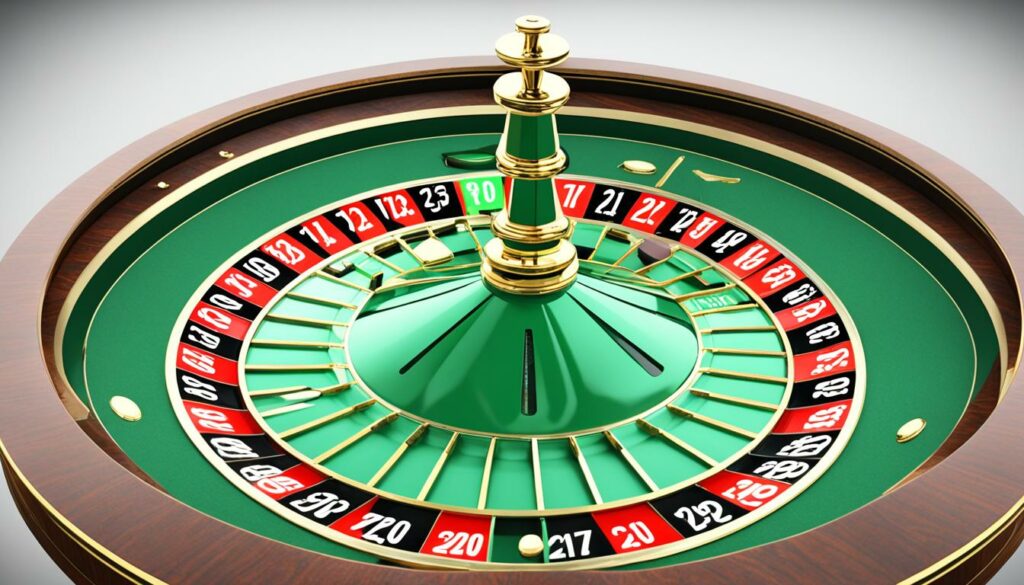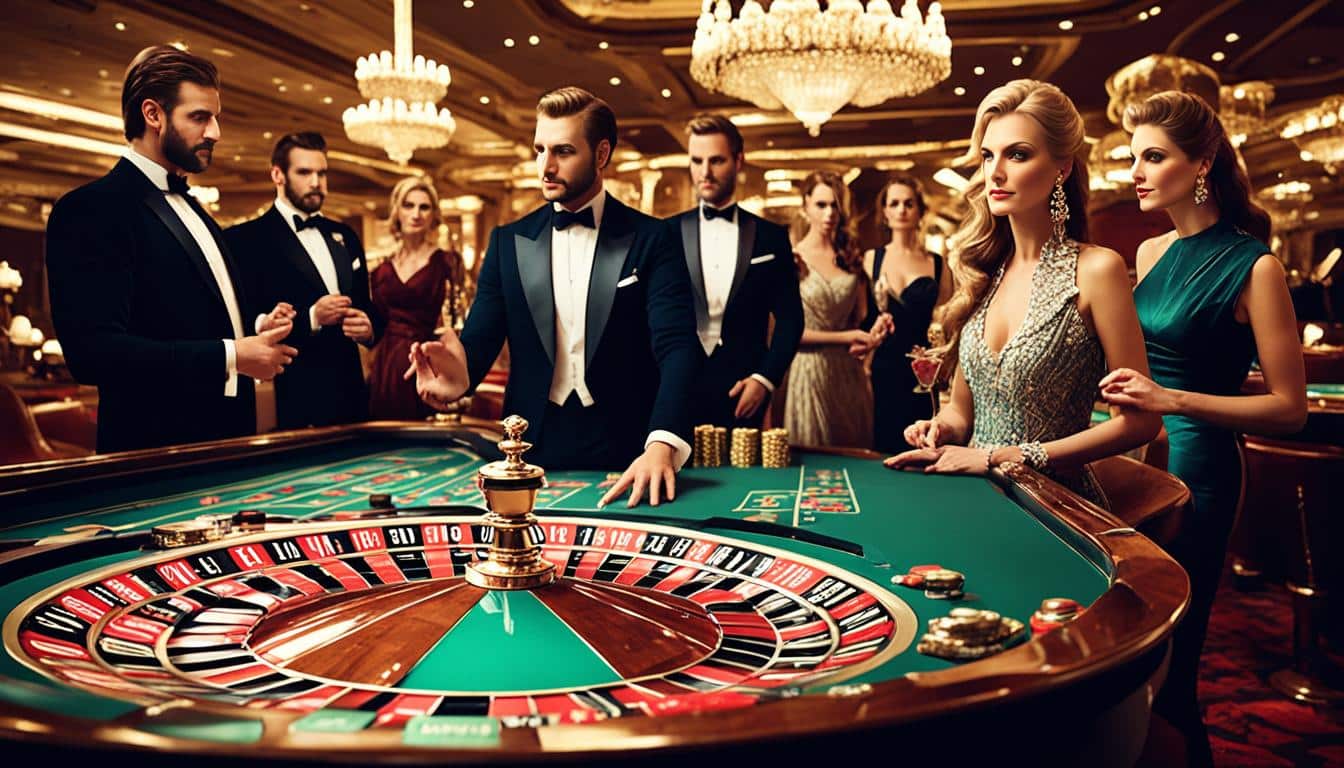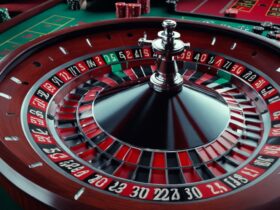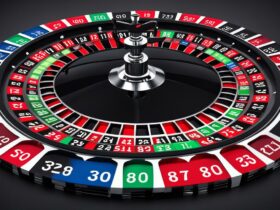Welcome to our fascinating journey into the enigmatic origins of the roulette game. In this article, we will delve into the intriguing history of this popular casino game and uncover the identity of its inventor. From its humble beginnings to its evolution into a global sensation, we will explore the roots of roulette and the individuals who shaped its destiny.
Have you ever wondered who invented roulette? The answer lies hidden within the annals of history, waiting to be discovered. Join us as we venture through time to unravel the mystery behind this iconic game.
Throughout our exploration, we will uncover the rich heritage of roulette, its remarkable journey across continents, and the influential figures who propelled its growth. From the birth of the roulette wheel to the role of France in shaping the game’s rules, we will unlock the secrets that have captivated generations of players.
We will also delve into the rise of roulette in the opulent Monte Carlo casinos, tracing its path as it spread throughout Europe. Additionally, we will explore the various adaptations and variations of the game that have emerged over the years, as well as the modern transformations brought about by online gaming.
By the end of this article, you will have gained a comprehensive understanding of the origins and evolution of roulette, appreciating the enduring appeal and fascination behind this captivating game. So, let us embark on this journey together, as we unravel the mysteries and unveil the roulette inventor.
The Early History of Roulette
The game of roulette, with its spinning wheel and numbered pockets, has a captivating history that dates back centuries. Let’s explore the origins and development of this iconic casino game during the 18th century in Europe.
Roulette is believed to have originated in France, although its exact origins remain mysterious. The word “roulette” itself means “little wheel” in French, which perfectly describes the key component of the game. While the precise inventor of roulette is unknown, it is widely attributed to Blaise Pascal, a brilliant mathematician, physicist, and inventor.
“The roulette wheel has become a symbol of chance and excitement in the world of gambling.”
The early versions of roulette were much different from the game we know today. Originally, the wheel featured 38 numbered pockets, including a single zero, a double zero, and numbers 1 to 36. Over time, the game evolved, and the double zero pocket was removed, resulting in the modern version with 37 pockets.
Roulette gained popularity throughout Europe, particularly in the 18th century. It captured the attention of aristocrats, intellectuals, and gamblers alike, who were drawn to its elegant simplicity and potential for big wins. The game spread across the continent, with different variations emerging in different regions.
Stay tuned as we explore the birth of the roulette wheel in the next section, and how it became an integral part of the game.
The Birth of the Roulette Wheel
One of the most iconic and integral components of the roulette game is the roulette wheel. The development of the roulette wheel played a significant role in shaping the game we know today. In this section, we will explore the invention and introduction of this fascinating device.
The development of the roulette wheel can be traced back to 18th century France. The early versions of the game, known as “biribi” and “hoca,” featured rotating wheels with numbered compartments. However, it was François Blanc, a French entrepreneur and casino owner, who revolutionized the wheel design and established the standard format of the roulette wheel that is still used worldwide.
Blanc’s addition of the number zero on the wheel in the mid-19th century was a pivotal moment in the development of roulette. The inclusion of the zero increased the house edge and provided casinos with an advantage, ensuring their profitability. This single modification set the stage for the continued popularity and enduring nature of the game.
To give you a visual representation of the roulette wheel, here is a table showcasing the numbers and colors on a standard European roulette wheel:
| Number | Color |
|---|---|
| 0 | Green |
| 1 | Red |
| 2 | Black |
| 3 | Red |
| 4 | Black |
| 5 | Red |
| 6 | Black |
| 7 | Red |
| 8 | Black |
| 9 | Red |
| 10 | Black |
| 11 | Black |
| 12 | Red |
| 13 | Black |
| 14 | Red |
| 15 | Black |
| 16 | Red |
| 17 | Black |
| 18 | Red |
| 19 | Red |
| 20 | Black |
| 21 | Red |
| 22 | Black |
| 23 | Red |
| 24 | Black |
| 25 | Red |
| 26 | Black |
| 27 | Red |
| 28 | Black |
| 29 | Black |
| 30 | Red |
| 31 | Black |
| 32 | Red |
| 33 | Black |
| 34 | Red |
| 35 | Black |
| 36 | Red |
This table provides a comprehensive overview of the numbers and colors featured on a standard European roulette wheel. It is worth noting that American roulette wheels also include a double zero (00) compartment, altering the odds and the overall gameplay slightly.
The birth of the roulette wheel marked a significant milestone in the development of the game, turning it into the thrilling and timeless casino classic we know today.

French Roulette Origins
France, known for its rich history and cultural contributions, played a pivotal role in shaping the rules and gameplay of roulette. The origins of French roulette can be traced back to the 17th century, adding an air of sophistication and elegance to the game.
One significant aspect of French roulette is the inclusion of the “La Partage” and “En Prison” rules. These rules provide players with increased chances of winning, making French roulette a popular choice among gamblers seeking favorable odds.
The “La Partage” rule states that if the ball lands on zero (0), the player who placed an even-money bet only loses half of their wager, reducing the house edge and enhancing the player’s chances of recovery. On the other hand, the “En Prison” rule allows players to keep their bet “imprisoned” for the next spin if the ball lands on zero, providing another opportunity to win back the entire wager.
French roulette also features a unique table layout compared to its European and American counterparts. The table’s design is aesthetically pleasing and includes the French names for various betting options, such as “Rouge” for red and “Noir” for black. This elegant layout adds to the overall allure and sophistication of the game.
French Roulette vs. European and American Roulette
While French roulette shares similarities with European and American variations, there are distinct differences that set it apart. The most notable difference lies in the number of zeros on the wheel. French roulette typically utilizes a single zero (0), whereas American roulette has both a single zero (0) and a double zero (00). This variation reduces the house edge and increases the player’s chances of winning.
Another significant difference is the inclusion of the “La Partage” and “En Prison” rules, which are unique to French roulette. These rules significantly impact the outcome of the game and provide players with added advantages that are not present in other versions.
Furthermore, the table layout in French roulette is distinct, featuring the numbers arranged in three columns. The table also displays the racetrack, allowing players to place more complex bets, such as Voisins du Zéro (neighbors of zero) and Tiers du Cylindre (third of the wheel).
“French roulette not only embodies the elegance and charm of the country but also offers players favorable odds and unique gameplay features.”
With its origins deeply rooted in France, French roulette remains a sought-after casino game around the world. Its sophisticated rules, captivating table layout, and favorable odds continue to attract gamblers who appreciate the game’s rich history and the thrill of spinning the wheel in pursuit of fortune.

| Key Features | French Roulette | European Roulette | American Roulette |
|---|---|---|---|
| Number of Zeros | 1 (0) | 1 (0) | 2 (0, 00) |
| “La Partage” Rule | Yes | No | No |
| “En Prison” Rule | Yes | No | No |
| Table Layout | Distinctive, includes French names | Standard | Standard |
Monte Carlo and the Roulette Game
After its introduction to France, the game of roulette quickly became a favorite pastime of the French nobility and aristocracy. However, it was in the glamorous casinos of Monte Carlo that roulette truly came into its own and gained worldwide popularity.
The Casino de Monte Carlo, located in the famed resort city on the French Riviera, played a pivotal role in transforming the roulette game into a symbol of elegance and sophistication. The opulent surroundings of the casino, combined with the thrill and excitement of the roulette table, attracted the wealthy and famous from all over Europe.
Monte Carlo’s reputation as a gambling mecca was solidified in the latter half of the 19th century, thanks to the efforts of François Blanc. Blanc, a French entrepreneur, convinced the Prince of Monaco to legalize gambling in order to revitalize the struggling economy of the principality.
Under Blanc’s leadership, the Casino de Monte Carlo became synonymous with luxury and extravagance. The roulette tables inside the casino became the center of attention, captivating players with their elegant design and the allure of the spinning wheel.
“The Casino de Monte Carlo is the epitome of grandeur and excitement. It was here that the game of roulette truly flourished and attracted the aristocracy of Europe. The casino’s iconic roulette tables became an essential part of the Monte Carlo experience, offering players a chance to indulge in high-stakes gambling while being surrounded by unparalleled luxury.”
– Casino Enthusiast Magazine
The popularity of the Monte Carlo casino game spread rapidly throughout Europe. The allure of the roulette tables in Monte Carlo was irresistible, and soon, wealthy gamblers from all corners of the continent flocked to the French Riviera to try their luck.
The success of the game in Monte Carlo also played a crucial role in establishing European roulette as the preferred version of the game. Typically played with a single zero pocket, European roulette provided better odds for players compared to its American counterpart, which featured a double zero pocket.
As news of the excitement and glamour surrounding the Monte Carlo casino game spread, other European casinos began to adopt the game of roulette. From major cities like Paris and Berlin to smaller gambling establishments in picturesque towns, European roulette soon became a staple in the casino industry.
| Year | Event |
|---|---|
| 1863 | The Casino de Monte Carlo is officially opened to the public. |
| 1873 | Jules Verne features the Casino de Monte Carlo in his novel “Around the World in Eighty Days,” further enhancing its reputation. |
| 1892 | The Blanc brothers introduce the single-zero roulette wheel, revolutionizing the game. |
| 1901 | The Casino de Monte Carlo undergoes major renovations, solidifying its position as a global gambling destination. |
Variations and Adaptations
Over the years, the game of roulette has seen numerous adaptations and variations, each adding its unique twist to the classic casino game. These variations have sparked renewed interest and excitement among players, showcasing the creativity and ingenuity of those who have sought to put their own spin on the game.
American Roulette
One of the most well-known adaptations of roulette is American Roulette. This variant features an additional slot on the roulette wheel, known as the double zero (00), in addition to the single zero (0) found in European Roulette. The inclusion of the double zero increases the house edge, providing a different gameplay experience for those looking for a new challenge.
Mini Roulette
A delightful variation of the game, Mini Roulette offers a compact and fast-paced version of traditional roulette. In Mini Roulette, the wheel features only 13 numbered slots, ranging from 1 to 12 and a single zero. The reduced number of slots creates a thrilling and dynamic gameplay experience, making every spin even more intense.
Multi-Wheel Roulette
For those who crave excitement and action, Multi-Wheel Roulette offers a unique twist. In this adaptation, players can place bets on multiple wheels simultaneously. The game typically features up to eight spinning wheels, enhancing the potential for big wins and intensifying the thrill of the game.
Live Dealer Roulette
In the age of online gaming, Live Dealer Roulette has gained immense popularity. This adaptation brings the excitement and authenticity of a land-based casino to the comfort of your own home. Players can interact with real-life dealers through a live video stream and place their bets in real-time, creating an immersive and realistic gaming experience.
These are just a few examples of the many adaptations and variations that have emerged since the invention of roulette. Each variant offers a unique twist on the classic game, ensuring that players of all preferences can find their perfect match. Whether you prefer the traditional European Roulette or the fast-paced Mini Roulette, there’s a variant out there for everyone to enjoy.
Modern Roulette and Online Gaming
With the advent of modern technology, the game of roulette has undergone a significant transformation. Online gaming platforms have revolutionized the way players engage with this classic casino game. Today, enthusiasts can enjoy the thrill of roulette from the comfort of their own homes or on the go.
One notable development in online roulette gaming is the introduction of live dealer games. These immersive experiences allow players to interact with real-life dealers and other players in a virtual setting. Through advanced streaming technology, players can witness the spinning of the wheel and the dropping of the ball in real-time, replicating the excitement of a land-based casino.
This modern adaptation of the game bridges the gap between online and offline gambling, providing players with an authentic and interactive roulette experience.
Furthermore, online platforms offer a wide range of roulette variations, catering to different preferences and betting styles. From European and American roulette to French and mini roulette, players can explore a plethora of options without the limitations of physical casinos. This variety ensures that there is something for everyone, whether they prefer traditional gameplay or seek a unique twist on the classic game.
Another key aspect of online roulette is the ability to access games anytime, anywhere. Whether on a desktop computer, laptop, tablet, or mobile device, players can enjoy the excitement of roulette at their convenience. This accessibility has made the game more inclusive and opened up new opportunities for players around the world.
Comparison of Land-based and Online Roulette Gaming
| Aspects | Land-based Roulette | Online Roulette |
|---|---|---|
| Convenience | Requires physically visiting a casino | Accessible from the comfort of home or on the go |
| Variety | Limited to the available tables at the casino | Offers a wide range of roulette variations |
| Interaction | Interact with dealers and players physically | Live dealer games provide virtual interaction |
| Availability | Restricted by casino operating hours | Accessible 24/7 |
| Betting Limits | Varies depending on the casino | Flexible betting limits to suit different budgets |
As the game evolves and adapts to the digital age, it continues to captivate players worldwide. The convenience, variety, and immersive experiences offered by online roulette gaming have made it a preferred choice for many enthusiasts. Whether you’re a seasoned player or a novice looking to try your luck, online roulette brings the excitement and thrill of the casino right to your fingertips.
Conclusion
Throughout this article, we have explored the fascinating origins and evolution of the roulette game. From its mysterious inception to its enduring popularity in modern times, roulette has captured the hearts and minds of players around the world.
We have learned that the roulette game has its roots in 18th-century Europe, with France playing a pivotal role in its development. The introduction of the roulette wheel revolutionized the game, adding an element of thrill and chance that is still present today.
Monte Carlo’s prestigious casinos contributed to the game’s rising popularity, propelling it to become a symbol of elegance and sophistication. Over the years, roulette has undergone variations and adaptations, catering to the different preferences of players.
In recent times, the advent of technology has taken the game to new heights, with online roulette gaming becoming a popular choice for players worldwide. Yet, despite these advancements, the allure of the spinning wheel and the anticipation of the ball landing on that winning number remain at the core of the game.
As we conclude our journey through the captivating history of roulette, it is evident that this game continues to captivate and entertain. Its timeless appeal and the thrill it offers both experienced players and novices alike ensure that roulette remains a beloved classic in the realm of casino gaming.







